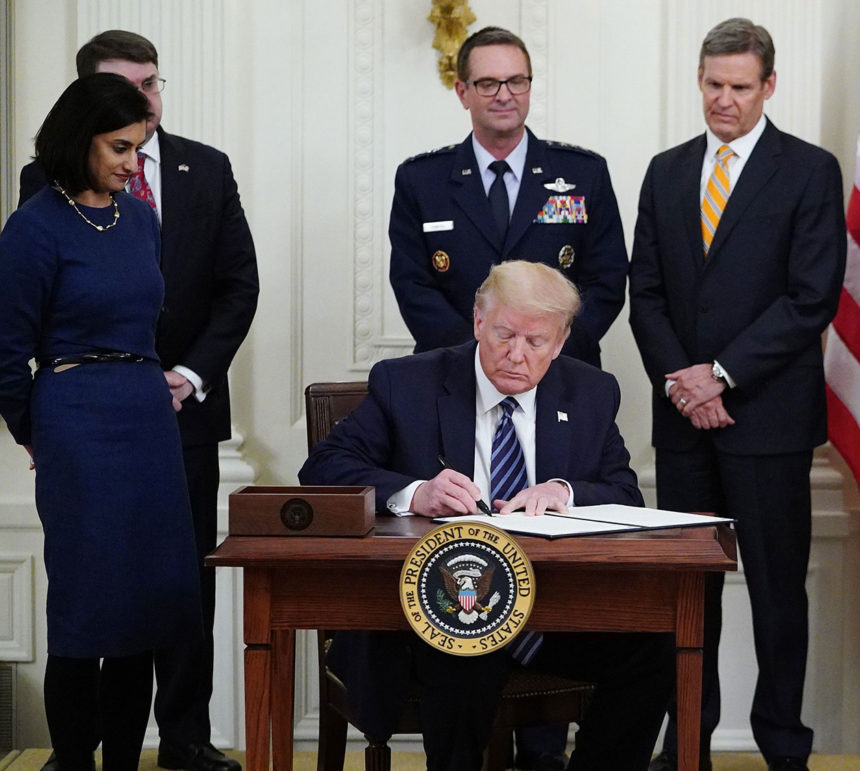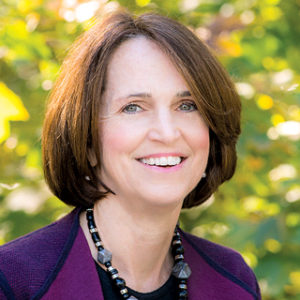
Just hours after attending an announcement ceremony in the East Room of the White House on Thursday, leaders of the two top U.S. nursing home associations gave wildly different views of new federal action plans for nursing homes.
LeadingAge President and CEO Katie Smith Sloan strongly refuted President Trump’s claim that: “We’re taking very special care of our nursing homes and seniors.”

“This is false,” Smith Sloam said in a statement. “The time for talk, symbolism and proclamations has passed. It’s time for action from the White House and Congress.”
The White House on Thursday announced that it is creating a new nursing home quality and safety panel and is delivering personal protective equipment to COVID-19-endangered facilities. Smith Sloan said the day’s announcements “fell far short of what’s needed to protect the most vulnerable Americans from the coronavirus.” While much of her ire was over a lack of assistance offered to non-nursing home entities, she also ripped what was being offered.
“Pretending a symbolic one-week supply of PPE for select nursing homes is a meaningful solution is an insult to millions of vulnerable Americans, their families, and their caregivers,” Smith Sloan said. She was referring to federal plans to twice deliver seven days’ worth of masks, gowns, eye protection and gloves to each of the 15,400 U.S. nursing homes sometime before July 4. “FEMA’s two, one-week supplies of PPE distribution are wholly insufficient.”
She said that the amounts “appear symbolic” because current conditions require “20 times more PPE than usual,” yet the Federal Emergency Management Agency will deliver selected communities “fewer than 8 masks per staff member.”
“As economies open up, there has been no prioritization announced or older adults — who must now compete with nail salons and gyms for life-protecting supplies on the open market,” Smith Sloan continued.
She also called the administration on the table for elevating only symptomatic workers and residents to the top priority level for testing. Various studies have shown that a large percentage of nursing home infections have been present in asymptomatic carriers.
“The only way to avert this slow-motion catastrophe is to provide meaningful amounts of PPE, as well as effective and efficient testing and a comprehensive approach to supporting older adults and the workers who care for them,” Smith Sloan emphasized.
She expressed pleasure at the way the government was funding and taking care of Veterans Affairs long-term care residents.
“But it’s astonishing and insulting to hear that millions of older Ameriocans at other nursing homes will have to make do with token supplies, a few iPads and a proclamation — and a new commission,” she added.
“We need more than a post-war-type commission to examine a tragic battle — because the nation’s nursing home and aging services providers are still on the front line fighting — and it feels like we are fighting alone.”
Applause for new initiatives
The leader of the American Health Care Association and National Center for Assisted Living took a more conciliatory tone.

Although there was no mention of the $10 billion fund dedicated to nursing homes that he had advocated for just a day earlier, Association President and CEO Mark Parkinson called the commission and Thursday’s plans “an important step forward to ensure long-term care facilities receive the vital support needed during this unprecedented health crisis.”
The AHCA/NCAL leader thanked administration officials for their support and said that the day’s announcements sent “a clear message about the important role of long-term care in the national healthcare system and our responses to the COVID-19 pandemic.”
Also announced Thursday by the administration were a flurry of new 1135 blanket waivers, as well as details on reporting facility COVID-19 infections directly to the CDC.
Parkinson said that the focus needs to stay on long-term care residents and staff, and that facilities will need “more PPE, testing and resources” because “long-term care facilities face an uphill battle in stopping this virus.”
White House unveiling
The formation of the new task force was announced two months after a Seattle-area nursing facility was identified as the site of the first U.S. outbreak of the novel coronavirus, and a month after a federal report was released expounding on the origins and deadly nature of the spread.
Nursing home personnel have accounted for as many as 25% of the 63,000-plus confirmed U.S. COVID-19 associated deaths as of Thursday, though many states’ numbers are not included in the calculations, and many expect the actual numbers to be much worse. In Europe and elsewhere, the proportion of nursing home deaths to the overall total is even higher.
The new panel will be officially known as the Coronavirus Commission for Safety and Quality in Nursing Homes. It will be composed of leading industry experts, doctors and scientists, resident and patient advocates, family members, infection and prevention control specialists, and state and local authorities. The commission will first meet in May.
“The commission will comprehensively assess the response,” Centers for Medicare & Medicaid Services Administrator Seema Verma said during an afternoon press conference. “It will identify best practices, and also provide recommendations for how we go forward to protect our nursing home residents and make sure we are providing the best quality of life.”
“Your pain is our pain, and we are doing everything we can to support you,” Verma said in reference to nursing home residents and their families.
Trump acknowledged that the federal response to nursing home needs has been inadequate, but officials said that should be bolstered soon by two weeks’ worth of personal protective equipment being shipped to each of the nation’s 15,400 nursing homes. Quantities shipped will be based on staffing and PPE usage rates.
Nursing facilities in some of the country’s most densely populated areas — including New York, New Jersey, Chicago, Boston and Washington, D.C. — will receive the first shipments, starting next week.
“It’s a spot that we have to take care of,” Trump said. “I guess you could call it a little bit of a weak spot, because things are happening at the nursing homes that we’re not happy about that. We don’t want that to happen.”



